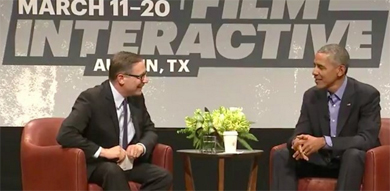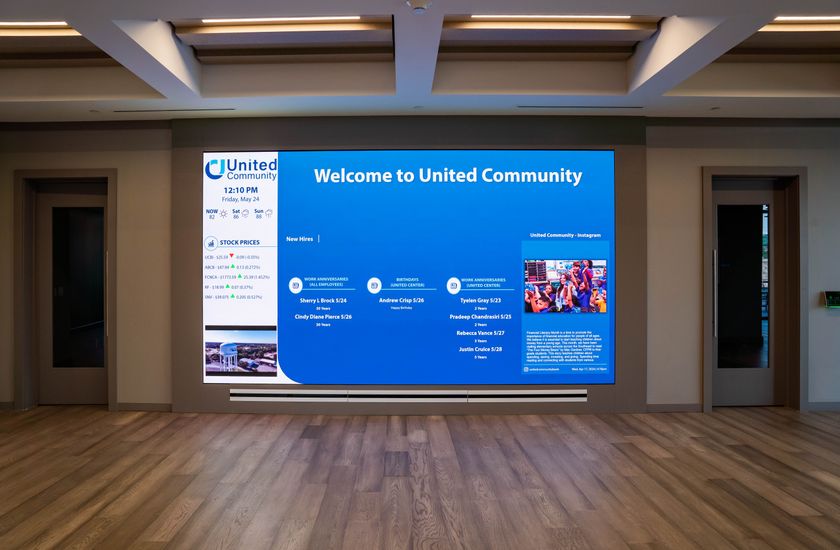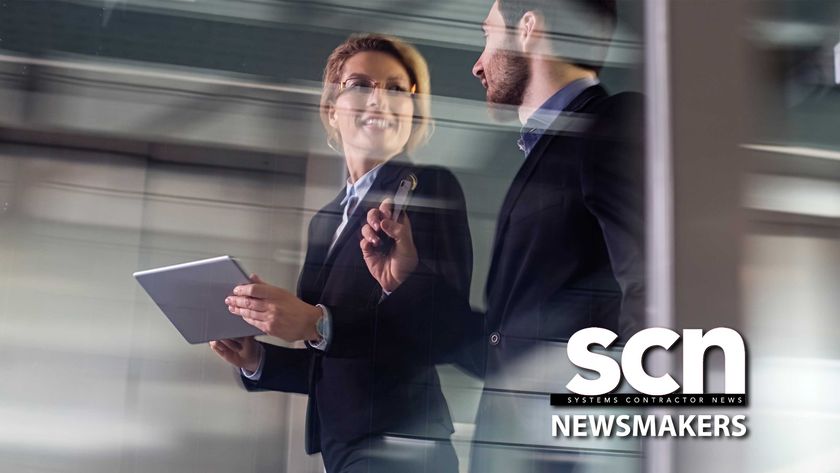Technology and government– it’s a topic that could fill days and weeks of panels, keynotes, and sessions at a hundred conferences. And its controversies are in the headlines daily across this country and are key to nothing less than our national identity as we weigh everything from security vs. privacy in the digital age to the hyper media-laden selection process for our leaders. So what should we make of the very late addition (not announced until last week) of the President of the United States to the agenda at SXSW Interactive, that kicked off today in Austin? For a trade conference that crowdsources session topics a year in advance, and is famously as inclusive thematically as you can be and still call yourself a technology conference, was this new keynote going to be a major address on technology issues or just another and rather impromptu ring in the sprawling circus that is the mash-up of Sx (“southby”, shorthand for all things SXSW Interactive, SXSW Film, and SXSW Music)?
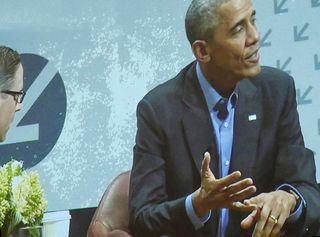
Evan Smith and President Barak Obama at SXSW Interactive
The vast majority of SXSW Interactive attendees could not get into the afternoon “keynote” from President Obama today (admission to the special event for SXSW Interactive badged attendees was by lottery, due ostensibly to the late notice of the event, and demand was off the charts) and press access was highly controlled by the White House press office (not by the SXSW press office). So if you’re reading this chances are you could not hear POTUS in person, and divining the significance of the event– well, good luck with that on Twitter and generally in the noise of Sx and with main stream media nomination-obsessed for months on end. Before the event is buried in a sea of Sx social media– and if you can put aside your civic skepticism in this year of surreal political media and general negativity about government that comes with every big election year– know that it was and should be a heads up on some intriguing initiatives that the U.S. government is undertaking. Whoever you want in the White House next year we should all follow up on this interesting groundwork that is being laid, modest brick by digital brick, to bring better civic engagement and more importantly better delivery of government services to all–factory workers, students, soldiers, immigrants, veterans– not a lot of whom were in the audience with the president at SXSW Interactive today but all of whom should benefit from these new programs.
If you’ve read this far and you’re thinking, great, but at a major technology conference certainly the president would address the heavy tech issues like the Justice Dept. vs. Apple, or Net Neutrality. On a con call with official Press covering the lead-up to the event yesterday, I asked Kristie Canegallo, deputy chief of staff at the White House, if the president would be addressing Net Neutrality in his comments at SXSW. It’s a hugely important topic that has been a controversial issue in every tech community (and has been covered at SXSW the last few years). It’s barely on the mainstream media’s radar, certainly not this year, but it’s crucial and the FCC and the Congress don’t seem to have resolved the issue of whether the Internet is a “public utility” that should be regulated like a common carrier, or is some kind of new hybrid utility that needs unique regulation or special status. Cut to the chase, Canegallo replied to my question (after an oddly long silence) that “there is no change in the President’s position” on that issue. In the keynote today, indeed there was no discussion at all about Net Neutrality. It never came up. In this election year it’s understandable that this issue is back burner, but there are so many implications of Net Neutrality for every technology market– copyright issues if squilabytes of content move over a public utility, bandwidth throttling, special Comcast/Netflix-like “transit agreements”– something has to give at some point. Congress must re-designate Broadband carriers as common carriers, which the FCC has not done yet, or– well, what are the other options? There won’t be any answers in this election year.
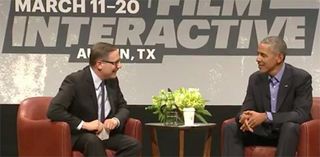
It was an SXSW event, and anyone who has ever been to SXSW knows that formal presentations and powerpoints and stats and bullet points verbal or graphic are bad form here. It’s all about casually sharing the new new thing in talks with or freewheeling presentations to other tech insiders. Which is why the president’s “keynote” was not a keynote but featured Obama in a sports jacket sitting in a leather chair opposite Evan Smith of the Texas Tribune in a free-range Q&A. It’s too bad it was not a better venue to actually look at the specifics of the new tech initiatives the White House is trying to get some buzz for. Obama mentioned them all, but it was not easy given the venue and the format to learn a lot about them today. They are:
The U.S. Digital Service (USDS) came to be, according to co-founder Haley Van Dyck, speaking at a Ted Talk earlier this year, from the “spectacular and well-documented failure” of the Healthcare.gov. [Editor's note: Van Dyck will be presenting at SXSW Interactive on Monday the 14th– see the end of this article for details.]
“I passed it,” said Obama in today’s keynote, referring to the Affordable Care Act, “but then the website didn’t work. And our campaign had been premised on cool technology… but procurement systems, the software, were developed in an era when the government was buying boots not software.”
He went on to explain that “we had to bring in a SWAT team from Silicon Valley, and Austin, and we fixed it in three-four months time. So we learned that we could build a digital SWAT team. And we have done that with the US Digital Service.”
Haley Van Dyck has compared USDS to “the Peace Corps for nerds.” And Obama explained today that “folks coming in for sometimes six months, sometimes two years… to make sure veterans are getting services, and more. Folks working in US Digital Services are having a great time. As long as they have a president that can provide ‘air cover’, they can accomplish goals, so my goal it to see that this goes forward…”
And those USDS goals are worthy ones, whatever your political leanings: U.S. Digital Service teams are taking on streamlining of services for veterans, the health insurance marketplace, making the student loan process more efficient, as well as helping along the move to electronic health records, coming up with digital tools to combat human trafficking, and more. It’s staffed by some of the country’s best designers, engineers, and product managers (many of which are employees of tech companies like Facebook, Google, Amazon and Twitter) who sign up for “short term tours of duty” to help fix government systems and services.
Another initiative discussed by the president today is ConnectEd. Launched in 2013, it’s designed to “enrich K-12 education for every student in America… to empower teachers with the best technology and the training to make the most of it, and empowers students through individualized learning and rich, digital content.”
Much of the ConnectEd effort is about getting broadband everywhere. At SXSW, there’s not a single attendee who could comprehend life (or 5 minutes) without megabandwidth at their fingertips. But aside from the (important) fact that all kids need broadband to get a proper education, everyone attending SXSX or reading this should remind themselves that from a strictly business perspective their companies will prosper with more customers in the form of more schools and more consumers (in this case students). Tech is not always about the new cool thing. It’s also about getting last year’s technology to millions of more customers– there’s good business there too.
The president’s appearance at SXSW was never going to be a long one. After starting late, the 40 minutes flew by with not enough detail on the White House’s tech programs. But despite the short window to have a sitting president address your session, there was no way you were going to have that president on the stage with a journalist (and a great one in Smith) without the conversation being steered away from the wonkier if important tech programs back to controversy– not media-created controversy or election year theatrics but real controversy.
Wrapping up with some Q&A from Texas Tribune readers, Evan Smith related that a questioner (all questions had been submitted online from the Texas Tribune web site) wanted to know, given that Obama was at SXSW to try to “persuade the tech community that they should work with government… and it looks to some in the tech community, at least some in the tech community, that the government is the enemy of the tech community in the way that it is dealing with Apple”, where did the president come down on the privacy vs. security issue? (Referencing of course the Apple vs. FBI case.)
“I can’t comment on the specific case, so let’s set that aside,” said Obama. “All of us value our privacy, and this is a society that is built on a constitution, and a bill of rights, and a healthy skepticism about overreaching government power. Before smartphones were invented, and to this day, if there is probable cause to think that you have abducted a child, or that you are engaging in a terrorist plot, or if you are guilty of some serious crime, law enforcement can appear at your doorstep and say ‘we have a warrant to search your home’ and they go into your bedroom… to see if there is any evidence of wrongdoing…. and we agree on that… because we recognize that just like all our other rights, freedom of speech, freedom or religion, etc, there are going to be some constraints that we impose in order to make sure that we are safe, secure, and living in a civilized society.”
“Now technology is evolving so rapidly,” he continued “that new questions are being asked. And I am of the view that there are very real reasons why we want to make sure that government can not just willy nilly get into everybody’s smartphones that are full of very personal information.”
The president stressed that the security vs. privacy issue also has a “security vs. security” angle. In other words, encryption is not just something that tech consumers in this country want, in seeming opposition to the government’s security needs, but encryption is needed by our own institutions to protect from foreign intrusion and compromise.
“What makes it even more complicated is that we also want really strong encryption,” Obama explained. “Because part of us preventing terrorism, or preventing people from disrupting the financial system, or our air traffic control system, or a other whole set of other systems that are increasingly digitized, is that hackers, state or non state can get in there and mess them up.”
“We have two values, both of which are important,” the president went on, getting back to the domestic security vs. privacy conundrum. “And the question we now have to ask is, if, technologically, it is possible to make an impenetrable device or system where the encryption is so strong that there is no key, there is no door at all, then how would we apprehend the child pornographer, how would we solve or disrupt a terrorist plot, what mechanisms do we have available to even do simple things like tax enforcement, because if in fact you can’t crack that at all, government can’t get in, then everybody is walking around with a Swiss bank account in their pocket. So there has to be some concession, to the need to be able to get into that information somehow. Now what folks who are on the encryption side will argue is, any key whatsoever, even if it starts off as just being directed at one device, could end up being used on every device, that’s just the nature of these systems. That is a technical question. I am not a software engineer. It is I think technically true, but I think it can be overstated. So the question becomes, we as a society– setting aside the specific case between the FBI and Apple, setting aside the commercial interests, concerns about what the Chinese could do with this even if we trust the U.S. government, setting aside all those question– we are going to have to make some decisions about how we balance these respective risks.”
“We have engaged the tech community to help solve this problem. My conclusion so far is that you cannot take an absolutist view on this. So if your argument is strong encryption, no matter what, and that that we can and should in fact create black boxes, that I think does not strike the kind of balance that we have lived with two hundred, three hundred years, and it’s fetishizing our phones, above every other value, and that can’t be the right answer. I suspect the answer is going to come down to how do we create a kind of system where the encryption is as strong as possible, the key is as secure as possible and accessible by the smallest number of people possible for a subset of issues that we agree are important. How we design that is not something that I have the expertise to do…”
“I am not interested in overthrowing the values that have made us an exceptional and great nation, simply for expediency,” the president concluded. “But the dangers are real. Maintaining law and order and a civilized society is important. Protecting our kids is important. So I would just caution against taking an absolutist perspective on this. Because we make compromises all the time. I’ve haven’t flown commercial in a while [to much audience laughter] but my understanding is it’s not great fun, going through security. But we make concessions and it’s an intrusion on our privacy, but we recognize it’s important. We have stops for drunk drivers… The notion that somehow our data is different and can be walled off from those other trade-offs we make, I believe is incorrect. We do have to make sure, given the power of the internet, and how much our lives are digitalized, that it is narrow, and there is constraint, and there is oversight. And I’m confident this is something we can solve. But we are going to need the tech community, software designers, people who care deeply about this stuff, to help us solve it. Because, what will happen is, if everybody goes to their respective corners, and the tech community says either we have strong perfect encryption or else it’s Big Brother… what you’ll find is, after something really bad happens… it will become sloppy and rushed, and it will go through Congress in ways that have not been thought through and then you really will have dangers to our civil liberties because the people who understand that best who care the most about civil liberties have disengaged or taken a position that is not sustainable for the general public as a whole, over time.”
To which moderator interviewer Smith jumped in and said that they were “out of time– you gave a great answer on that, Mr. President– so I’m happy to have that [privacy /security] be the last bit.”
To which the president replied, to much applause, “I’m the President... so I am going to take a few minutes here and say: there are number of ways in which all of you can plug into what I have been talking about today. If you are interested in figuring out ways to make government services work better, go to US Digital Services. If you are interested in how we can make sure that classrooms are properly connected, plug into what we are doing with ConnectEd. One of my favorite projects that's just gotten started over the last several months is… diapers are really expensive… and we’ve actually set up a system whereby, through social media and the internet, not-for-profits are able to make bulk purchase of diapers, save 25% on those, so that they can distribute them to low income families, and it’s a convergence of diaper companies, logistics companies, and internet companies… running through a government program…”
“Whatever your passions are,” the president concluded, “whatever your interests are, we need you. I want to underscore the fact that in ten months I will not have this office. It has been the great privilege of my life… but it’s not like I stop caring about the things that I care about now. And it’s not like I am going to stop being involved and promoting the best, the most prosperous, the most peaceful, the most tolerant, the most ecologically responsible America, that I can. I’ll be sitting in the audience with you. And I expect you to step up, and get involved, because the country needs you, and if the brainpower and the talent that’s on display here today and throughout this conference takes up that baton, then I’m going to be really confident about the future of this country.”
The president made– as presidents do– a swift exit from the SXSW stage after a warm reception by this group of tech professionals and a few local pols and general access that was put together hurriedly. And the crowd had to make it across the unusually rainy streets back downtown to the other SXSW events, maybe not sure what to make of it all. In search again of the cool new tech thing. And if not inspired with Kennedy era-like enthusiasm for our country at least back to the digital fray with some serious food for thought. All in, it was a refreshing change even for a conference that’s known for unpredictable and envelope-pushing speaker and panel selections. It was part politics, part technology, and part swan song from a president that clearly wanted to impart a message more positive than anything we’re getting in the mainstream press this year about anything related to Washington. I’m still not sure that the president despite his preface did not “comment on the actual case” in his privacy vs. security remarks, and perhaps open up even other concerns. I am sure that the audience today was happy he addressed the issue, regardless of their own opinions on the matter. My hope after a pretty extraordinary trade show session is that we all, regardless of how we’ll be voting this fall, do think more about how our industry can harness– with government or other partners in the effort– the extraordinary talent and the tech tools that we’ve created to solve urgent problems in our society not just this month’s business challenges.
Editor’s note: SXSW Interactive continues with activity in this vein. Among other sessions, this one that includes some top White House players:
Monday March 14:
We the People: Using Tech to Solve Big Challenges
http://schedule.sxsw.com/2016/events/event_PP91100
